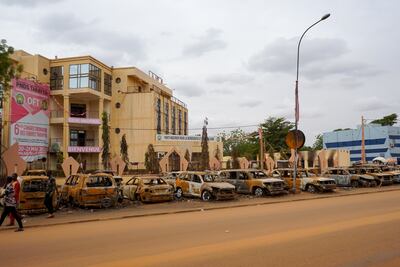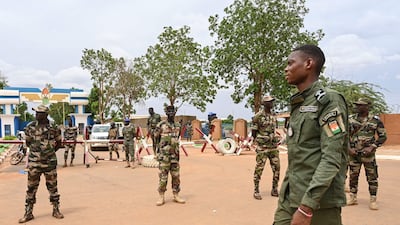Niger’s new military regime appeared under pressure on Sunday, calling for dialogue with the Economic Community of West African States (Ecowas), a regional bloc that imposed harsh sanctions on the country after a military coup on July 26.
The junta’s takeover saw the swift implementation of international sanctions, with neighbouring countries cutting electricity exports to Africa’s second-largest country by area, and one of its poorest.
Government assets were also frozen, flights over the country’s airspace were halted and Ecowas warned military intervention was an option if the former government was not restored.
Ecowas condemned the junta's move on Monday, calling it a "provocation".
"[The move] contradicts the reported willingness of the military authorities in the Republic of Niger to restore constitutional order through peaceful means," Ecowas said.

But the prospects for a diplomatic end to the stand-off seemed remote as the military rulers, who ousted democratically elected President Mohamed Bazoum and placed him under house arrest, said on Sunday he would be tried for “high treason”.
Ecowas is said to be preparing a “standby” military force, ramping up pressure on the military rulers, led by General Abdourahmane Tchiani. The bloc has called for Mr Bazoum’s immediate release, although on Sunday said it was preparing a diplomatic delegation to head to Niger’s capital, Niamey, for talks.
“We’re open to a dialogue that can lead to the lifting of sanctions,” said the junta’s appointed prime minister, Ali Mahamane Lamine Zeine. “These measures are inhumane, exceptional and unacceptable,” Mr Zeine told state TV Tele Sahel following a visit by a mediation mission of religious leaders from Nigeria.
The regime said it had gathered evidence that it would use "to prosecute the deposed president and his local and foreign accomplices before the competent national and international bodies for high treason and undermining the internal and external security of Niger," according to a statement read out by Colonel-Major Amadou Abdramane on national television.
Following a series of UN statements calling for Mr Bazoum’s release and expressing concern for his health, military leaders said they had not taken over his residence and that he was still free to communicate with the outside world. Mr Bazoum had received regular visits from his doctor, they said.
A consultation took place on Saturday, according to an adviser to the ousted president.
"After this visit, the doctor raised no problems regarding the state of health of the deposed president and members of his family," the military added.
The ousted leader said he was being held "hostage" without electricity and had only rice and pasta to eat.
Niger, which is home to small contingents of US, French, German and Italian soldiers, was one of the last remaining western allies in the western Sahel region of Africa, which has been rocked by a years-long Islamist insurgency involving groups linked to al Qaeda and ISIS.
Western-backed governments in Mali and Burkina Faso have fallen to military coups in recent years, now led by pro-Russia military rulers, derailing security co-operation efforts with local forces to stem terrorism.
On Sunday, six Niger soldiers and 10 "terrorists" were killed during fighting in the West of the country, authorities said.
Suspected jihadists on motorbikes ambushed the troops near the western town of Sanam on Sunday, according to a statement issued by the National Guard High Command.
Sanam is in the Tillaberi tri-border area where Niger meets Mali and Burkina Faso, a region where jihadist attacks are common.
On August 9, five soldiers were killed in an attack in the same area, according to the military regime that has been in power since the overthrow of President Mohamed Bazoum on July 26.
Gene Tchiani has justified the overthrow of Mr Bazoum by referring to the "deteriorating security situation" in the country.

